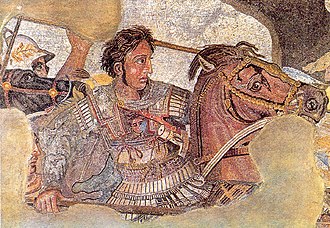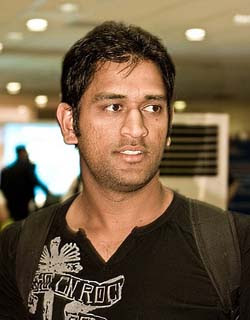History of Alexander the Great(intro)
Alexander the Great
Alexander III of Macedon (20/21 July 356 – 10/11 June 323 BC), commonly known as Alexander the Great (Greek: Ἀλέξανδρος ὁ Μέγας,Aléxandros ho Mégasiii[›] from the Greek ἀλέξω alexo "to defend, help" + ἀνήρ aner "man"), was a king of Macedon, a state in northern ancient Greece. Born in Pella in 356 BC, Alexander was tutored by Aristotle until the age of 16. By the age of thirty, he had created one of the largest empiresof the ancient world, stretching from the Ionian Sea to the Himalayas.[1] He was undefeated in battle and is considered one of history's most successful commanders.[2]
Alexander succeeded his father, Philip II of Macedon, to the throne in 336 BC after Philip was assassinated. Upon Philip's death, Alexander inherited a strong kingdom and an experienced army. He was awarded the generalship of Greece and used this authority to launch his father's military expansion plans. In 334 BC, he invaded Persian-ruled Asia Minor and began a series of campaigns that lasted ten years. Alexander broke the power of Persia in a series of decisive battles, most notably the battles of Issus and Gaugamela. He subsequently overthrew the Persian King Darius III and conquered the entirety of the Persian Empire.i[›] At that point, his empire stretched from the Adriatic Sea to the Indus River.
Seeking to reach the "ends of the world and the Great Outer Sea", he invaded India in 326 BC, but was eventually forced to turn back at the demand of his troops. Alexander died in Babylon in 323 BC, without executing a series of planned campaigns that would have begun with an invasion ofArabia. In the years following his death, a series of civil wars tore his empire apart, resulting in several states ruled by the Diadochi, Alexander's surviving generals and heirs.
Alexander's legacy includes the cultural diffusion his conquests engendered. He founded some twenty cities that bore his name, most notablyAlexandria in Egypt. Alexander's settlement of Greek colonists and the resulting spread of Greek culture in the east resulted in a new Hellenistic civilization, aspects of which were still evident in the traditions of the Byzantine Empire in the mid-15th century. Alexander became legendary as a classical hero in the mold of Achilles, and he features prominently in the history and myth of Greek and non-Greek cultures. He became the measure against which military leaders compared themselves, and military academies throughout the world still teach his tactics.[3]ii[›]
| Alexander the Great | |
|---|---|
| Basileus of Macedon, Hegemon of the Hellenic League, Shahanshah of Persia, Pharaoh ofEgypt, Lord of Asia | |
 | |
| Alexander fighting the Persian king Darius III. FromAlexander Mosaic, Naples National Archaeological Museum | |
| Reign | 336–323 BC |
| Predecessor | Philip II |
| Successor | Alexander IV Philip III |
| Reign | 332–323 BC |
| Predecessor | Darius III |
| Successor | Alexander IV Philip III |
| Reign | 330–323 BC |
| Predecessor | Darius III |
| Successor | Alexander IV Philip III |
| Reign | 331–323 BC |
| Predecessor | New office |
| Successor | Alexander IV Philip III |
| Spouse | Roxana of Bactria Stateira II of Persia Parysatis II of Persia |
| Issue | |
| Alexander IV | |
| Full name | |
| Alexander III of Macedon | |
| Dynasty | Argead dynasty |
| Father | Philip II of Macedon |
| Mother | Olympias of Epirus |
| Born | 20 or 21 July 356 BC Pella, Macedon |
| Died | 10 or 11 June 323 BC (aged 32) Babylon |
| Religion | Greek polytheism |

Comments
Post a Comment